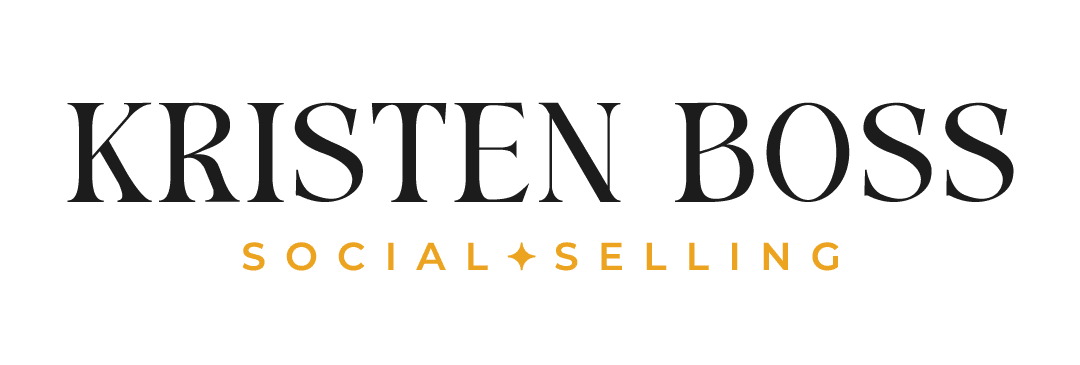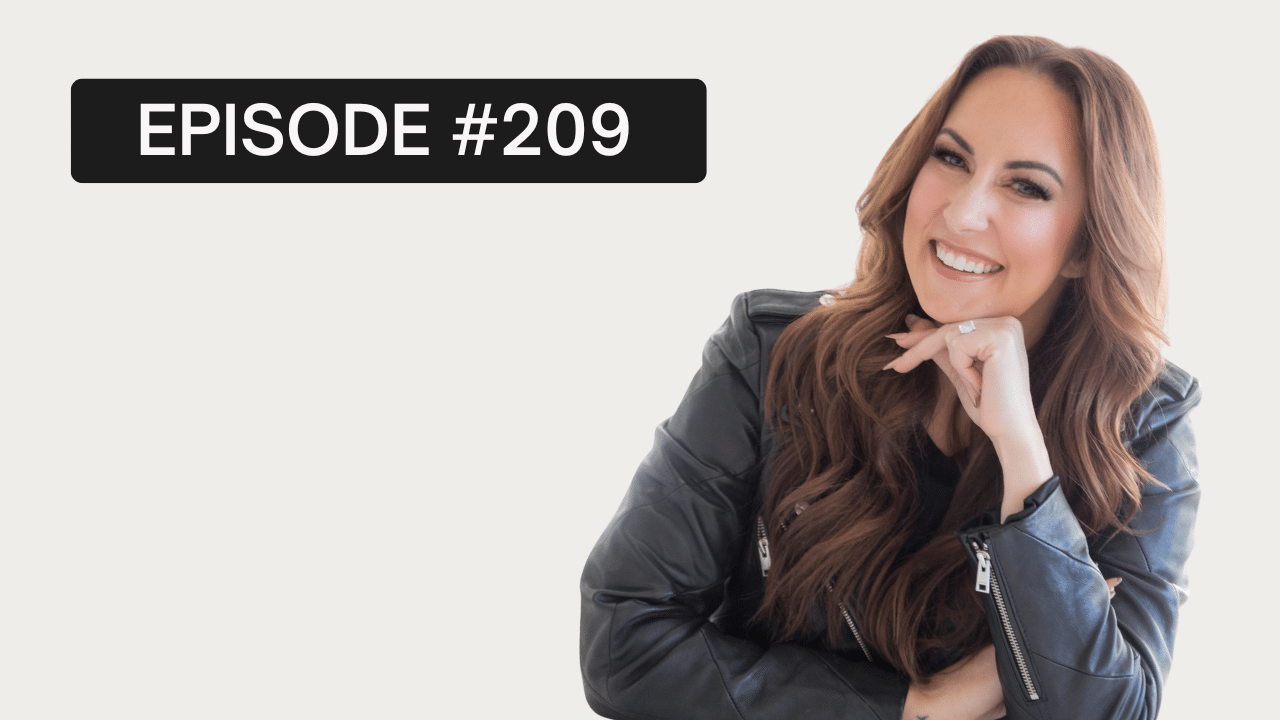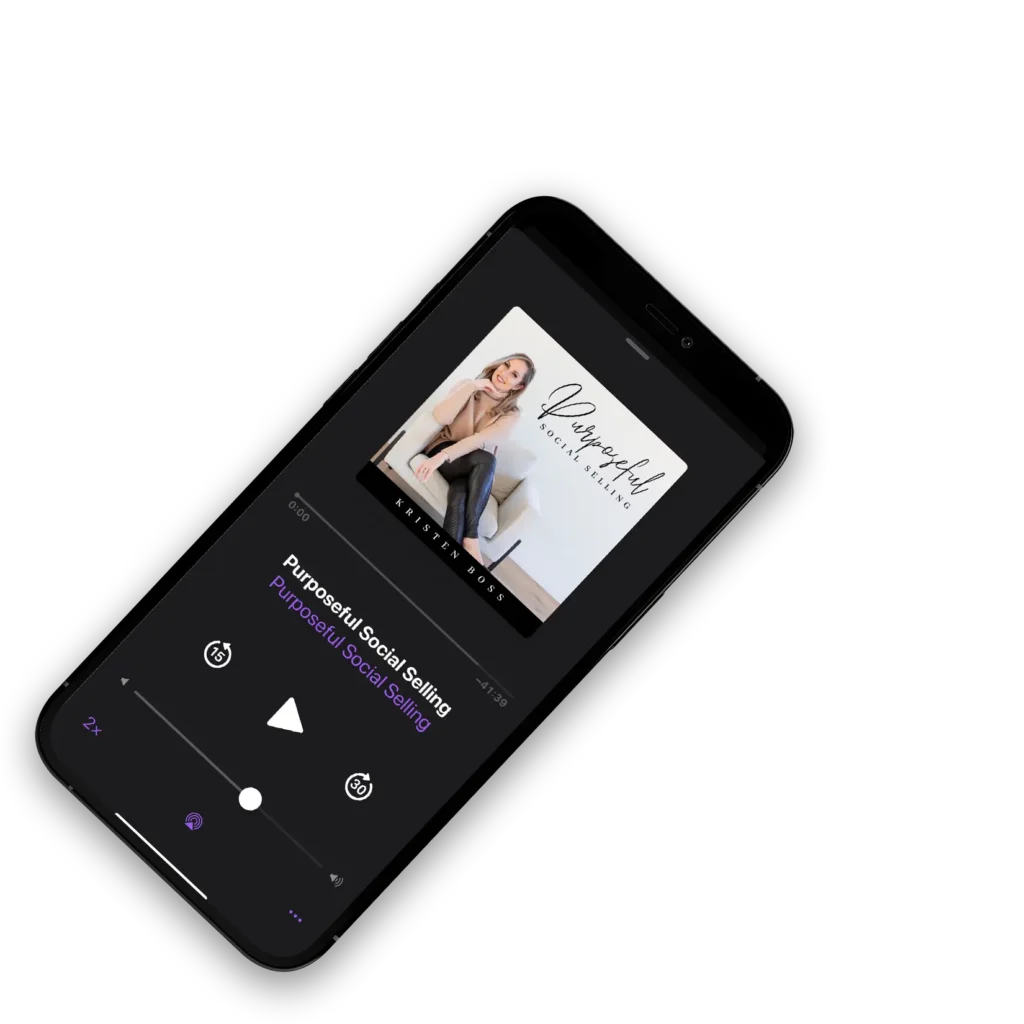Starting a business often stems from a combination of determination and desperation. People, dissatisfied with their current situation, establish the courage to initiate transformative change. However, as they overcome obstacles and achieve a semblance of stability, a subtle shift occurs. The initial desperation fades, and a sense of complacency can set in.
Kristen has identified a consistent trend, which she refers to as the “subtle settle.” This refers to the initial burst of motivation and drive that propels individuals into their entrepreneurial journey, but gradually diminishes over time.
Here are a few highlights:
- What begins as a journey fueled by determination and ambition can gradually lose momentum, leaving entrepreneurs feeling stagnant and uninspired.
- Kristen emphasizes the importance of maintaining clarity of vision and staying connected to the underlying purpose that drives you forward.
- Ask yourself tough questions: Why is it important to go all the way? What meaning does this journey hold for me? What discomfort am I willing to endure to attain my goals?
- True growth requires a willingness to embrace discomfort and confront the obstacles that stand in the way of success.
It’s time to stop using scarcity as the fuel in our businesses, to stop looking behind and start focusing on the future. Remind yourself why you embarked on this journey in the first place. Don’t succumb to the guilt of the subtle settle; instead, reconnect with your vision.
The Social Selling Leadership School is OPEN! The SSLS is a 14-week Advanced Leadership Certification program for Network Marketers. This program was designed to give you everything you need to be a confident and transformational coach for the people you serve and help your team get massive results. This is the ONLY Coaching Certification program built specifically for the social selling market. Find out more and join here: https://www.thesocialsellingleadershipschool.com
Thanks for listening! Do you have a question about network marketing? Kristen can help! Drop your question here, and she just might answer it live on the podcast: https://kristenboss.com/question/
Transcript for Episode #199: The Subtle Settle
Kristen Boss (00:19): You are listening to the Kristen Bos podcast. I’m your host, Kristen Bos. As a bestselling author and performance coach, I’m on a mission to share about sustainable and purposeful approaches to both business and life. Each week I bring relevant topics that I believe are necessary to create a life of purpose, significance and meaning. Entrepreneurship is about so much more than growing your bottom line. It’s about who you are becoming in the process and building a life that is truly extraordinary. Entrepreneurship is really just the beginning.
Kristen Boss (00:57): Hey, bosses, welcome to another day, another episode of this podcast. I’m glad you’re here. I’m excited about today’s topic, and right now, I don’t know what the weather’s like where you are right now, but right now I’m looking outside my window. It’s about six inches of snow and it keeps coming down. And it wasn’t a snow day for school today, so I’m like, what? We needed a snow day. Anyways, I hope you are having a great start to your new year, and I wanted to talk about something that I think can plague any entrepreneur or really anyone who’s bettering themself or aiming to improve in any area of their life, whether it’s your finances, your business, your health. I guarantee you have felt this. And so we’re going to talk about it today. And I’m calling it the subtle, subtle, say that 10 times, but it’s almost like quiet, quitting.
Kristen Boss (01:51): But this is different. It’s subtle settling, and I guarantee you might be in it now or you’ve experienced it at one point. And this is when I noticed it. So if you’ve been listening to the podcast for a few episodes, and I have my dog Hank in here with me, by the way, and that’s him scratching his collar being really loud. So if you hear that in the background, that’s my chocolate lab, hank the tank. Anyways, we’re going to go back to, okay, so if you’ve been listening to my podcast for any length of time, you know that I’ve been on a health journey since April of last year, like a really serious one, working with my coach, weight training. I’ve lost a fair amount of weight. I’ve lost about 25 pounds, and I’ve got about 15 left I want to lose. And so I am really proud because during the holidays I managed to maintain my weight loss.
Kristen Boss (02:41): I enjoyed cookies and spiked peppermint, hot chocolate and all the things and travel. I traveled a ton. I was in Cabo earlier this year. I had a lot of margaritas. I will be happy if I never look at another margarita again because win in Cabo. But I was super proud that I managed to maintain my weight loss. But here’s what I noticed is I had experienced a lot of wins in my health journey. I had lost to 25 pounds. I was a lot happier with myself and pictures with what I saw in the mirror. And I got to start off this year with donating, oh my gosh, probably half of my wardrobe to some good friends of mine. I’m like, Hey, these are really nice clothes. It would just crush me to send them to Goodwill if people didn’t appreciate it. So I gave it to a couple of my girlfriends in business and it was all these really exciting things and I am replacing things in my wardrobe.
Kristen Boss (03:41): But then I noticed that lately I was lacking the same level of enthusiasm or drive or hunger as I did in the beginning of my weight loss journey. And I noticed that I was quietly almost trying to settle or negotiate with myself as to why here is pretty good. I’m like, oh, no, I like how I look. I am down a couple sizes. This is pretty fantastic. But listen, that’s not the goal I set for myself. Where I’m at right now is not actually my goal. My goal is another 15 pounds. My goal is to get there, but I’m noticing that my brain was starting to say, Hey, here’s not bad. Here’s pretty good. You could be good here. You don’t have to have those things or you don’t have to. Maybe you don’t want to do that, or maybe it’s not possible. And I noticed with those stories, my drive and my motivation were not so high, and I noticed that I was wanting to settle, settle.
Kristen Boss (04:48): And I noticed this happens with business owners that when people start their online business, they usually start from a place of desperation where the need is really high and therefore the need for change creates a high desire for change. It’s like they’re so uncomfortable with their current reality that they are willing to get uncomfortable to get out of that reality. They’re like, ah, this is terrible. I don’t want to be here. So you have this incredible drive to change things and it motivates you. And then I notice when people start, they’re no longer in that place of desperation where they’re no longer living paycheck to paycheck. There’s a little margin here and there. They’re not scraping by. They were, and they start to get comfortable, but they’re not at their goal. They’re far from their goal. But what’s happening is now there’s not desperation fueling their desire or fueling their motivation.
Kristen Boss (05:53): So because they’re not in pain anymore, they don’t know how to motivate themselves to go out and stay consistent or to go into the next level of discomfort. And this is where I noticed that people will stall in their business because they’ve quietly and very subtly settled for where they are because they’re not as uncomfortable as what they once were, and they’re actually pretty good. And they use the word it’s fine. Things are pretty good. And because they know getting to the next level of success or the next level of, for me, the last 15 pounds, or maybe for somebody to go from a hundred K to 200 K, they realize, oh, I’m going to have to get back into engaging in uncomfortable activity consistently. And what’s happened is they’ve become comfortable with their current reality. So they’re like, and remember, our brain doesn’t like being uncomfortable.
Kristen Boss (06:53): It’s always going to look for the path of least resistance. So if you are kind of comfortable with your lifestyle right now, then of course you’re going to be battling have this internal conflict of going out there and getting uncomfortable on purpose by going and doing really hard things because that’s what growth is. It’s choosing to get uncomfortable on purpose. Whereas in your current reality, you are comfortable. You might be comfortable. Now, some of you might be listening to this and you’re like, no, I’m in the season of desperation, and therefore your desire for change is quite high. But what happens when your reality starts changing and the level of desperation isn’t as high? Now, what I do see people do is as they make more money, they have something called lifestyle creep or they start spending more money. And so although they’re making more money, they still feel the same financial strain they did when they were broke because they’ve increased their spending lifestyle.
Kristen Boss (07:56): And so the margins are still scarce, and therefore what they’re trying to do is work in order to fund a lifestyle that they’ve created for themselves. And this is called lifestyle creep. And I think this is quite dangerous for a lot of entrepreneurs and why I’ve always warned people in any type of business, but particularly in the social selling business, maybe even in the coaching business, like beware how you sell a lifestyle business. Because lifestyle, in my opinion, should be about freedom. Your options, how you want to live your life, if it’s, and there’s nothing wrong with a nice house, a nice car, nice clothes, but if that’s what you’re selling to people, hey, do this so you can have nice car, nice clothes, nice things. Then what you end up positioning for yourself is like you have to work to keep that lifestyle. And that’s when I notice people stay in this very scarce, desperate place, even when they’re making maybe a million dollars because now they’ve increased their lifestyle so much that now they’re constantly, their hair is on fire in order to keep up with a lifestyle that they’ve created.
Kristen Boss (09:06): So I’m always about be very intentional with your spending and earning margins. And I could do a whole podcast episode just about how your business money should be treated so that you’re always abundant in your business. And I’ve talked about this before, when I got my first nice car, and it was a dream car I wanted to drive. I really wanted to drive a Mercedes, A-M-G-G-E, and I loved that car, and I recently took it in for a Tahoe. I was very sad because I loved my Mercedes, but we needed a bigger car for skiing and our dogs and all the things. And anyways, I remember going on to that parking lot and I made an agreement with myself. And this is the agreement. I try and tell every business owner who’s going for big things like, Hey, go for big things. Yes, have milestones, have ways to celebrate.
Kristen Boss (09:59): There’s nothing wrong with that, but the timing of that is really important, and your financial health around that is also very important. So I made an agreement with myself when I sat in the car on that Mercedes lot, and I didn’t drive off the lot that day with a car. I just sat in that car, smelled the leather, and I noticed all the stories that were coming up while I was sitting in the car. Like, oh my gosh, what is that person going to think of me? If they see me pull up in this car? What will my parents think of me? Well, will my siblings think of me? What do I think of me? Like, oh, am I a snob driving this car? Is this a bad thing? Do I look, show you guys? I had so many stories sitting in that car, and I’m really glad that I sat there and addressed those stories because those stories weren’t unique to the car.
Kristen Boss (10:38): It was unique to my, it applied to my whole business. Well, will that person think well, will that person think? What do I think? So anyways, the agreement I made with myself, and this kind of circles back to the point here, is I told myself I would not drive the car off that lot if I ever had a single thought about how many students or sales I needed to make in a particular month to pay for my car. And I knew if I was driving my car thinking about how I was going to pay for it, it wasn’t the right time for it because that meant I was living too scarce and the margins were too tight. I wanted to drive that car with abundance and with never thinking about the car payment. So if I was like, if I need to wait, then I’m going to wait.
Kristen Boss (11:22): But that is the agreement I make with myself. So this idea of oftentimes when I see people increasing their earnings, they get excited, but they also increase their lifestyle. And then that ends up creating this desperate relationship they continue to have for their business. They look through their business to fund that. And this is how I see stressed out millionaires. We think money solves all our problems. It’s how you handle your money that actually solves your problems. And so this is turning into a money episode, and I didn’t intend for it to be, but I’m really wanting to talk about this. What is fueling your desire to work? Is it desperation? And I think that’s why some people maybe will irresponsibly spend money because it subconsciously puts them in this desperate place that fuels them or puts them into work. And I remember one person I was coaching, she said, I just know if I was to stay consistent, my income would triple.
Kristen Boss (12:18): And I said, so let’s talk about why you’re not consistent. She’s like, well, and she’s like, I get comfortable. I was like, tell me more about that. She’s like, well, I’m making a lot of money, and she’s making multi six figures. She’s like, but she wants to make a million. I was like, and I noticed that she’s struggled with the subtle settle. She would start to, she makes a lot of money. Things are very different than when she first started working with me. And in a good way, she’s tripled her income and things are real good, and she gets comfortable, and when she gets comfortable, she takes her foot off the gas pedal and she stops doing the uncomfortable things in her business that she knows drives growth that she knows would help grow her business. And so I said, oh, that’s interesting. So tell me about when you do decide to work.
Kristen Boss (13:00): I was like, what’s the emotion that comes up for you when you finally decide to engage back in your work? And she’s like, anxiety. I said, why anxiety? She’s like, well, because I realized that I got to start making money. I was like, and how do you realize that? And we realized that she only knows how to work when she’s feeling a measure of scarcity. She actually doesn’t know how to work consistently when she’s not in pain. Isn’t that interesting? And so I was like, ah. So you’ve conditioned yourself to only work when you are feeling pain.
Kristen Boss (13:36): So the byproduct of that is you’ll let your business kind of sit until maybe the end of the month, and then suddenly scarcity will kick in, anxiety will kick in, panic will kick in, and you’ll go and do the uncomfortable business activities that you know should have been doing earlier that month in order to get you to be productive. But because you don’t know how to work. And I asked her, I said, do you know how to work when pain isn’t the driver? And she kind of had a huge aha moment. She’s like, I, I was like, ah. Then we have to learn to work from vision, not from pain. How interesting is that? I believe we subtle. We are guilty of the subtle, subtle when we’ve lost vision of our ultimate goal when we start settling for our current reality because it’s pretty comfortable.
Kristen Boss (14:27): And we’re not in the same pain we were when we started. So we settle, right? It’s no different than my personal health goals and my weight loss goals. I set out a goal to see X amount of pounds off, but also my coach and I have decided we’re really chasing the look. And because of muscle composition, it might not be that much. It’s just like, okay, I know loosely I had this goal to look like and feel like this. And for me, it was like I was wanting to negotiate with my end goal and being like, well, here’s pretty good. And when I started negotiating with myself and not being as concise and on point with my habits, and therefore my progress started to slow down, it’s because I lost vision for where I wanted to go. I got caught up in my current reality instead of like, okay, well, but where am I going?
Kristen Boss (15:17): Why is it important for me to dig in? So I said that to that student. I was like, you’ve lost vision. When you are guilty of the subtle settle and you start getting comfortable, it’s because you have talked yourself out of why your bigger future vision isn’t as important for you, and you’re looking backwards more than you’re looking forwards. Meaning looking backwards, looking at like, well, I’m not in as much pain as I used to be, so here’s pretty good. Whereas when you look at the future and then you notice the gap, that actually should create some pain and desire being like, okay, I don’t have it yet, therefore, and I have to remind myself all the reasons why it’s really important. And boom, now we have desire again. Now we have the grit and the tenacity and the habits to actually attain the goal.
Kristen Boss (15:59): And I was talking to my health coach about this. I was like, Hey, I have this thing and I think I’m going to do a podcast episode on it. I’m going to call it the subtle, subtle. He’s like, Ooh, that’s really good. He’s like, I call it the danger zone. I was like, Ooh, tell me more. He is like, yeah. So this happens to a lot of clients. He’s like, they’ll lose a lot of weight, but they’re not to their end goal, but they feel pretty good. They’ve experienced so many wins. They’re in a smaller size and they’re more confident, and they’re all those things, and they’re not as sick and miserable and uncomfortable, physically uncomfortable as they were when they started. And that was all their pain that motivated them. He’s like, so now without the presence of pain, they start to negotiate. They start to get sloppy with their habits.
Kristen Boss (16:35): They slow down. They don’t really put their foot on the pedal to get them all the way to the finish line. And I was like, oh, so what do you do? What? Tell your clients? He’s like, well, for me. And he’s like, if you’ve listened to my episode with him, he’s a really, really fit dude. And so I even told him, I was like, Ben, when you decide to go all in, that’s for him. It’s like going from an already fit person to being stage ready. So I’m like, what do you do? He’s like, yeah. He’s like, I make up pain. I imagine pain. I was like, oh, that’s interesting. Tell me more. He is like, well, I just tell myself that how embarrassing it would be to show up at an event as the head trainer and not be the fittest one out of everybody.
Kristen Boss (17:19): So he uses, he’s like, I create stories in my mind that cause pain to get me out of the subtle, subtle or as he calls the danger zone. So here’s my encouragement to you. If you have lost the vision, if you’re not as hungry, if you’re not as on fire as you were at the beginning, and this is how people say I’ve lost motivation. It’s not that you’ve lost motivation. It’s that you’ve lost vision. You’re no longer in touch with the vision of what you want. Because when we are really attached to our vision, it creates desire. And so maybe we’re not as led by pain. Maybe we’re more led by desire. And desire only happens when you sit down with your vision every single day, have a reminder, have a picture up somewhere on your desk to remind you of why you’re doing this.
Kristen Boss (18:04): This is why vision boards when they’re used correctly actually work. But a lot of people just will make the vision board and never touch it again. But I will tell you, every vision board I have made, I actually, which is crazy. I started making vision boards in, gosh, 20 17, 20 18, and I recently found one the other day. I was clearing out magazine clippings, and it was a bunch of clippings I had made or pulled out for a vision board. And I looked at it, I was like, holy moly, that’s my house. That’s the bathtub of a mountain house. That’s the car I was driving. I’ve done that trip. I’ve been on that stage. I’ve done that thing. And so there’s something about when I call it date our dream. And there was something even for me when I went to the Mercedes parking lot and I sat in that car, even though I didn’t buy it that day, what I was doing was I was imagining my future vision, and I was already addressing the stories that could potentially get in the way of me attaining that vision so that I wouldn’t subtly settle and be like, well, here’s pretty good.
Kristen Boss (19:09): Because at that point, I remember guys, when I was in the parking lot, at that point, I was already making six figures. I was able to not be in the salon anymore. I was doing pretty good. And I think we were, I was averaging like 20 K months. It was pretty nice, but I could have easily been like, here is good. Here’s good. But that wasn’t my vision. I had a vision to serve thousands of people, not 20 to 30 people. I wanted to serve thousands and hundreds of thousands, and I wanted a book and all of those things. So I’m like, all right, we got to introduce, get back in touch with our vision so that we can get back in touch with, so that we can have the hunger and the drive and the motivation. So friends, don’t be guilty of the subtle settle.
Kristen Boss (19:50): If you find yourself in or in the danger zone, it means you need to get back in touch with your vision and actually sit down and ask yourself, why is it important for me to go all the way? Why is that meaningful for me? And what discomfort do I need to be willing to intentionally feel in order for me to attain that goal? What do I need to do? I just want you to think about that, okay? And ask, what will that require of me? What will my beliefs have to look like? What will my behaviors have to look like? I remember there was a season, I think it was a year ago where it was right before I launched leadership school, and I was in a season of big development, and I was like, man, and just with what my daily schedule looked like, I’m like, well, what am I going to have to do?
Kristen Boss (20:34): Or what behaviors am I going to have to change or adjust in order for me to make that a reality? And at the time, my subtle settle would’ve been like, here’s pretty good. And like, oh, I can just keep sleeping until 7:00 AM. But in that season, I was like, no, can’t do that. What’s required of me in this season is I actually do need to wake up earlier and get these things done out of the way. And that was the season of waking up at 5:30 AM and that was, that was me choosing intentional discomfort when if you were to ask me every day of the week, I will choose sleep. But when I got clear on my vision and why the leadership school was so important, who was going to serve the lives, it was going to change the teams. It was going to change, the company was going to change how it was going to change the industry.
Kristen Boss (21:16): That’s what gave me, got me out of a subtle, subtle and back into the desire and the grit to do uncomfortable things like waking up early. So that’s my word for you today. Where are you quietly and very subtly settling halfway to your goal, partway to your goal, and maybe you’ve been subtly settling for the past couple years, and you’re like, it’s time to wake up. It’s time to wake up. It’s time to stop using scarcity as the only fuel in my business. Because when you, here’s the thing, if you condition yourself to only work when you feel scarce, you’re going to keep unintentionally subconsciously creating scenarios for yourself that immediately put you in scarcity, because your brain’s like, the only way I can get this person to work is feeling scarcity. So what can I do to create scarcity? I’ll go and blow all my money on that thing.
Kristen Boss (22:16): So now we feel like we have no money. Great. Now I’m going to go and work more because I’ve created a scarce scenario for myself. This is where we have to bring in self-awareness and be like, oh, I see what’s happening here. And if you can be on top of that and really get clear on, okay, how can I get in touch with my vision instead of constantly looking behind and like, oh, well, I’m not there anymore. So here’s good. No, get back in touch with your vision. Get back in touch with your future and why it matters. Don’t settle. We’ll catch you in the next episode. That’s a wrap for today’s episode. Listen, if you love what you heard here today, I would love for you to leave a real quick rating and a review. This helps the show get discovered by new people. Be sure to take a screenshot of today’s episode and shout us out on Instagram. We’ll shout you right back out. If you’d like to find additional resources or discover how to work with me, head to www.kristinboss.com.










